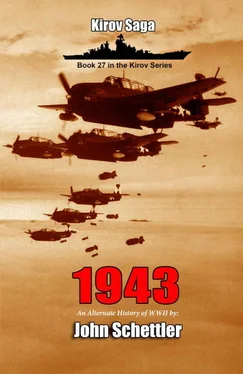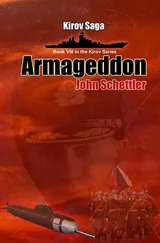“Excuse me?” said Gromyko, not understanding.
“Volsky,” said the Director. “There’s a perfectly good version of the man right here, but he’s from this sequence of events, this meridian in time, and has no knowledge of anything that happened.”
That was one thing Gromyko could not quite fathom yet.
“Are you not from this same meridian of time, as you call it?”
“Yes, and I know what you are asking me with that. If I am from this timeline, then how is it I know all the things I’ve been talking about?”
Kamenski had given him a long and confusing explanation, and he had sorted through it in his mind for some time, remembering the Director’s words.
“Time is rather fastidious,” he had told him. “She doesn’t like wasting things, and is very fussy about that. I was almost certain that my lease on life had run its course. Heaven knows, I’ve been given more than enough time in this world. But it seems there are more worlds than we think, and this is just another one. Fedorov wanted to know where the missing men were going. Where was Orlov and all the rest? Then he became one of those missing men himself. Yet time takes away, and time gives back as well. She found a place for him, as she just found a place for me when I vanished aboard Kirov . You can feel it coming, you know. You tend to feel a bit… insubstantial. For the longest time I thought it was that little treasure I had in my pocket, the key. You know nothing of that, but let’s just say it was a kind of lucky charm. I thought it kept me safe and sound, but now I think it’s just something that helps time go about her business.”
“Director… I’m just not sure I’m following you here.”
“Ah, forgive me if I tend to ramble on. The older you get, the more things you have tucked away up here, and time keeps pouring more tea in my cup. One day it will run over, but for now, I still hold it well enough. Let me put it to you this way. Suppose you were writing a story. You think you have it just the way you want, then you get an idea that simply must be given form and shape in the narrative. So you do a little editing here and there, and write a new chapter. At the end of the day, you save it, overwriting the old file with the new. That’s what time is doing. Well now, you would think your characters would have the good manners to forget the old file—the way things were before you made all those changes and additions to the story—but it seems they don’t, at least in my case. I’m a file that has been saved and replaced a good many times, but I remember each version of the story I lived in before. Yes, each and every one.”
And that was the genesis of Kamenski’s plan. Gromyko had been told to put out to sea, run his control rod procedure, and leave things to time. Once he got back to the 1940s—if he did get back at all—he was to try and find either Fedorov or Volsky. The first thing he did was call on the secure channel Fedorov had given him, and lo and behold, there was Fedorov. He said he was in an airship, and arranged to meet with him, but he never made that rendezvous, and that seems to have changed everything—yet again.
Now Gromyko finally understood what Kamenski had been trying to tell him with his metaphors about teacups and editing books. He knew it in the most direct way possible, because it had happened to him. The Captain had clear memories of leaving Severomorsk, running his procedure, shifting safely back and having that nice little chat with Fedorov. Then he turned in, eager for the bunk after a long day’s operations, and when he woke up to assume his shift in the command sail, everything was different.
The boat was in a different position, the crew a bit confused, and they soon learned that the time had shifted on them as well. It was as if they had slipped again, some strange after effect from the magic worked by that control rod.
Even his head was different, for in it now was a completely different version of his transit to this place! As he thought about it, he realized it must have been spawned by that errant remark made by Kamenski about having a perfectly good Admiral Volsky at hand. Now he recalled that plan in clear detail. Kamenski had put Volsky aboard in Severomorsk, confident at last that if he did send that version of the Admiral along, Time would sort all the rest out.
“He’ll either get there, or he won’t,” Kamenski had told him. “If he turns up missing after you shift, it will most likely be because there is already another version of him there where you have arrived. Time won’t permit the two of them to cohabit that same milieu like that, and so the Admiral you take on board will simply not arrive with you when you shift.”
“You mean he’ll just vanish?”
“Something like that.”
“Where will he go?”
“Elsewhere. Never mind about that now Captain. Just worry about your mission. If he remains with you, all the better. Use the good Admiral to get close to Fedorov and that ship. If he vanishes, then look to find him at large somewhere in the world. Find him, or get to Fedorov. That’s the key.”
But there was Volsky that morning, right on his boat, and in Gromyko’s head he could now remember two versions of this mission, one where he left Severomorsk on his own, and a second where Kamenski put Admiral Volsky aboard. Apparently, something had happened, like a train being switched to a new track, and now he was sailing on the meridian where Volsky had boarded Kazan at the very beginning, and all the new memories of that were now in his head. But how? It must have been that little bump we took on landing here, he thought. The shift was not complete. We appeared, then vanished again, only to reappear with Volsky aboard. Very strange.
Gromyko didn’t know it yet, but something had indeed happened. Fedorov was behind it all. Instead of making his planned rendezvous with Gromyko, Fedorov’s airship overflew a hole in time, and he found himself back in 1908, right where he had intended to go in the first place. There he had the fate of all these meridians in his hand. The choice he made in that fateful encounter with Mironov, would cement the meridian that went forward from that moment. Time would allow many threads in her loom, but one day she must weave them all into one strand again and create the new Prime Meridian. Fedorov’s choice to spare Mironov, to spare Sergei Kirov, had decided the matter, and at that moment, a Heisenberg wave was generated that migrated forward, all the way to its real point of origin in the year 2021.
This tiny outlier of change was very small, just the first ripple in a series of waves that would eventually sweep forward like a tsunami. Only one man was even aware of the change—more tea in his cup, or perhaps just one more chapter in his inner book—Pavel Kamenski. It was like a song that had begun on one of those old record players the Director was still fond of, and then the needle skipped, encountering a flaw, and was bumped back. That brief segment of the song played again, and only Kamenski knew why. So he realized that his plan to send Admiral Volsky might actually work now, because things had changed again. Fedorov’s mercy had changed them, though he did not know that at the time.
So he sent the Admiral along, though it seemed that it would take some time for Volsky to wake up and have his own tired head filled with past lives—other versions of himself that had also taken this journey. To make sure that would happen, Kamenski slipped something into his pocket before he boarded Kazan —a small key. “Keep that safe for me, will you?” he had said with a smile.
And Volsky woke up as well, and he remembered—remembered everything, all the events that had been lived and experienced by any version of his own self that was entangled with the meridian in which he now found himself after Kazan shifted—the new Prime Meridian, the line of fate and causality that Fedorov had assured by failing to kill Sergei Kirov.
Читать дальше












